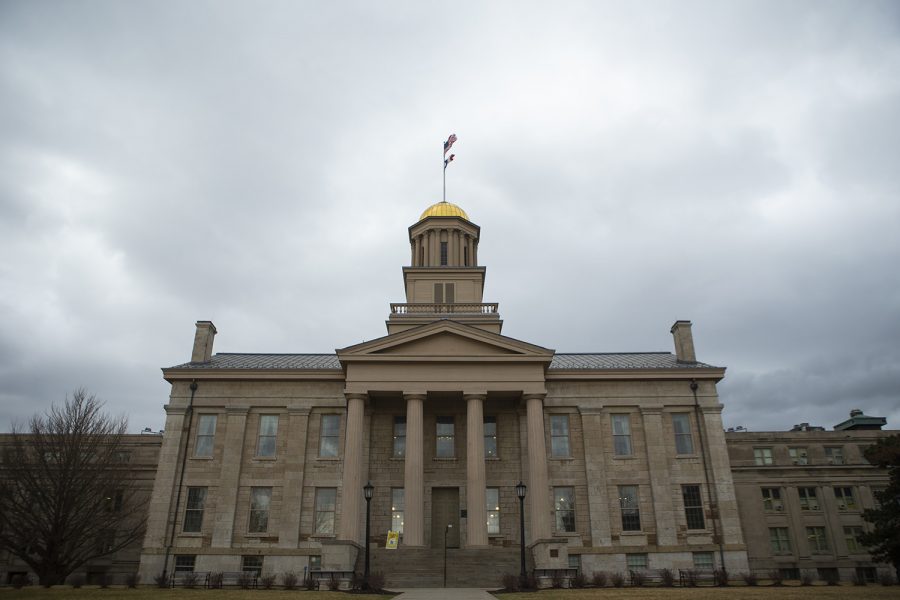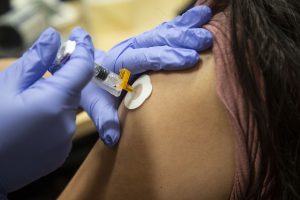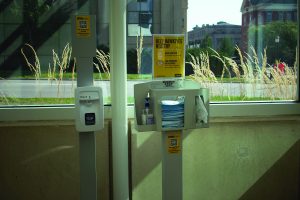Meaning behind the UI students self-reporting COVID-19 tests
University of Iowa faculty, staff, and students are required to self-report positive coronavirus cases or if they were in close contact with someone who tested positive. Iowa State University requires people to report if they test positive off-campus, while the UI does not.
The Old Capitol is seen on Thursday, March 12, 2020.
September 15, 2020
University of Iowa faculty, staff, and students are expected to self-report positive or presumed positive COVID-19 tests to the university. These numbers are emailed three times each week to the UI community, to inform it of the current spread of coronavirus on campus.
Johnson County case numbers have reached new highs since the start of fall classes. There have been 4,822 cases in Johnson County, and the UI has reported 72 new COVID-19 cases among students and 4 among UI employees since Sept. 11.
There have been 1,804 self-reported positive cases among students and 27 among faculty since the beginning of the semester.
UI Campus Health Officer Dan Fick said UI community members are expected to self-report their COVID-19 test results if they have talked with a health-care provider about having a positive test or have been contacted by a public health agency for being in close contact with someone who tested positive.
He added that people are not required to report a negative test result to the university.
UI Director of Student Health Paul Natvig said UI Student Health has facilitated over 2,000 coronavirus tests since the start of classes. This includes tests conducted by UI Student Health and tests conducted at UI Hospitals and Clinics that were ordered by UI Student Health.
UI Student Health is working with Johnson County Public Health to provide contact tracing for students, faculty, and staff who test positive for the coronavirus, Fick said. Johnson County Public Health provides contact information for individuals testing positive and affiliated with the university, he said.
“If those individuals have not self-reported, they are contacted and requested to report,” Fick said. “All contacted individuals have self-reported to date.”
RELATED: University of Iowa reports 53 new positive COVID-19 cases
Iowa’s ten peer institutions have taken different approaches. The University of Minnesota welcomed its students back to campus Sept. 8, two weeks after the UI began fall instruction on Aug. 24.
In an email to The Daily Iowan, UMN Public Relations Strategist Caitlin Hurley said students have access to 59 testing sites across two counties in the Twin Cities where the campus is located.
If UMN students and faculty get tested for the coronavirus off campus, they are not required to report their results.
“As such, the university cannot ask students, faculty and staff to disclose to the university their current COVID-19 status,” Hurley said. “This means the data on the dashboard is not fully reflective of the Twin Cities campus community.”
At Indiana University, mitigation testing is used to identify and isolate students who have COVID-19, but are not showing any symptoms. Indiana University Health administered 205,103 COVID-19 tests as of Sept. 8.
At the UI, self-reported numbers are broken into two groups — one for employees and one for students. Graduate students fall into the same category as undergraduate students.
Breaking the numbers into small groups, such as by college, department, or on campus status, could lend too much information and lead to identifying students, violating federal health laws, said UI Assistant Vice President for External Relations Jeneane Beck. The UI does not report COVID-19 cases to the public if the number is fewer than six.
“Following guidance from the Office of General Counsel, we cannot disclose FERPA or HIPAA protected health information about students if doing so will allow someone to identify particular individuals, as would be the case if the numbers are very low,” Beck said.
If the UI shared the numbers based on whether students live on or off campus or what year they are in school, it would violate the student’s right to privacy, Beck said.
No matter where a student, faculty, or staff member tests positive, if they report their association to the UI or record their residency in Johnson County, Beck said Johnson County Public Health will record their case.
Fick said the UI has not set a limit on the amount of times students, faculty, and staff can get tested for the coronavirus. The university is focused on following testing recommendations outlined by the Centers for Disease Control and Prevention, he said, meaning it will test people with symptoms and people who have been identified as a close contact by someone who has tested positive.
For those who have tested positive for the coronavirus in the past three months, the CDC does not recommend they get tested again, Fick said.
Unlike the UI, Iowa State University requires students to self-report even if they do not test through the university.
Each institution has different responsibilities regarding testing and how they coordinate with their county’s public health agency, Beck said. Story County Public Health delegated contract tracing to ISU, she said, while Johnson County performs the UI contract tracing.
She said Johnson County and the UI will compare self-reported cases and if Johnson County Public Health has a report the university does not, the UI will reach out to that student and encourage them to report. Students that have not self-reported for contact tracing have not received a violation at this time, she said, though it is possible to receive one in the future.
Students are expected to follow the student agreement they signed before returning to campus, Fick said. The agreement requires students to follow health and safety guidelines, including wearing face coverings, social distancing, and washing hands.
Beck said the UI Office of the Dean of Students reminded students on Aug. 25 that health and safety guidelines must be adhered to both on and off campus. Students can be held accountable for violating social distancing in areas throughout the county, including Coralville and North Liberty, she said.
“The language in the student agreement makes it clear that students are expected to cooperate with Johnson County. If they don’t, they may face consequences through the code of student life,” Beck said. “We are accomplishing the same thing as ISU through this process.”






